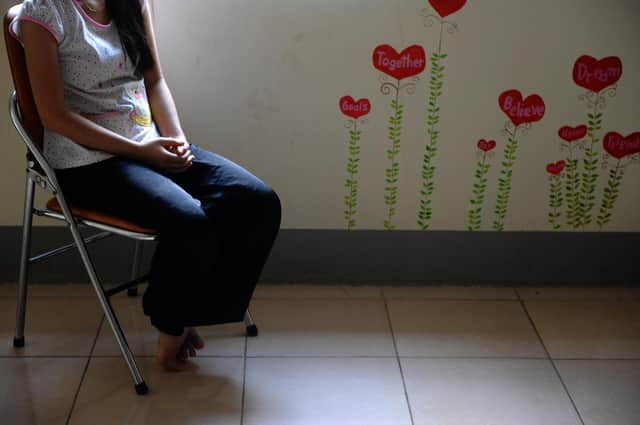Pimping websites that advertise trafficked women for rape must be prosecuted – Dr Jacci Stoyle


Amid the 16 Days of Activism against Gender-Based Violence, which began on Saturday, we really need to talk about pimping websites. You may never have heard of pimping websites, but if that is so, please read on, because they facilitate the most shocking human rights abuses of women that are taking place right here, right now, across Scotland and the UK.
In 2021, the Cross-Party Group on Commercial Sexual Exploitation in the Scottish Parliament published their inquiry report into sexual exploitation, “adult services” or “pimping” websites that advertise women for prostitution. Some also sell a variety of commodities online, such as furniture, household goods and bikes, as well as women’s bodies.
Advertisement
Hide AdAdvertisement
Hide AdYou may be wondering what the big deal is in 2023. In an increasingly technological age, wasn’t this inevitable? Yes, it was, and we were warned that it would happen. But let me ask you what effect you think it might have had on the numbers of women caught up in prostitution? Before our online revolution, paying for sex was a bit risky. A buyer had to find where the women were, he had to negotiate how to go about it, he risked being caught kerb crawling or having his car or face recognised. Buying sex is a secret activity and being caught and shamed to your wife, family and colleagues is a terrifying prospect. It used to be so much more difficult.
Tell-tale signs that women have been trafficked
Today everything is made so much easier for the sex buyer. Pimping websites are his fairy godfather. With a couple of clicks, he can scan a menu of young women’s bodies and pay with a pre-paid credit card. Quick, easy, and anonymous. No wonder the demand has skyrocketed.
So, who are the young women stepping into the breach to fill this shortfall? The cross-party group’s inquiry established that the traffickers and pimps were ready and eager to meet that demand through sex trafficking. The police report that the number of women trafficked into prostitution has risen to industrial proportions, and they admit they haven’t the capacity to meet this challenge.
There are plenty of red flags on the pimping websites that demonstrate trafficking is taking place. The police say that the websites enable them to check evidence; they can find multiple women having the same phone numbers on their forms, which belong to their traffickers, and there are repetitions of incorrectly written English occurring in several women’s profiles demonstrating that the same person has written it.
Money to be made from sexual slavery
However, this relationship with the websites hasn’t helped the police to successfully prosecute those traffickers or rescue those women, who are suffering from the trauma of non-state torture, as our menfolk line up, day in, day out, to rape them.
The United Nations Office on Drugs and Crime report in 2016 showed that 59 per cent of detected victims of trafficking globally were for sexual exploitation and 94 per cent of them were female. If you’re in the business of trafficking human beings, it is far more lucrative to do so for sexual exploitation than for any other form of modern slavery.
Typically, a victim of modern slavery will generate $3,978 a year for their trafficker, but for sex trafficking that amount rises to $36,000 (about £28,500). So, for one single minibus of young, trafficked, terrified women, you could have an annual turnover of more than half a million dollars. With websites concentrating the marketplace so conveniently for buyers, and human trafficking having such a low conviction rate, traffickers can bring multiple victims here and make vast sums of money with impunity.
The websites which facilitate this alliance of misery and hopelessness are by no means innocent or poor. The go-betweens make millions out of knowingly advertising prostitution and are complicit in its slave trade. The cross-party group’s inquiry offered an illuminating example: in 2018, it was revealed that a single trafficker had spent so much money advertising victims on one pimping website, that it responded, not by calling the police, but by allocating him a personal account manager.
Proceeds of Crime Act
Advertisement
Hide AdAdvertisement
Hide AdIf the police and criminal justice system do not have the capacity to successfully convict the traffickers, or to rescue these women, (and the alarming lack of successful prosecutions demonstrate that they don’t), then maybe we should look at the problem differently? Without excusing their inhumane criminality in any way, perhaps it would be easier to close down the websites, than to go after the traffickers?
The cross-party group’s inquiry established that new bespoke legislation is needed in this technological age to do the job properly. However, until then, under the Proceeds of Crime Act 2002, it may be possible to show that a pimping website is operating unlawfully in the UK, if the operator knows or suspects that the money it receives for hosting adverts constitutes or represents a person’s benefit from criminal conduct.
Whilst we wait with uncertainty for several years for the bespoke legislation to come into being, perhaps the police should try and implement this law that we already have. In addition, we should be asking the First Minister why he is not fulfilling the Scottish Government’s strategy of ‘Equally Safe’, which seeks to prevent and eradicate violence against women and girls. Having a powerful strategy, passionate rhetoric and hand-on-heart promises is worth nothing, if you turn a blind eye and walk on the other side.
Dr Jacci Stoyle is secretary of the Cross-Party Group on Commercial Sexual Exploitation in the Scottish Parliament